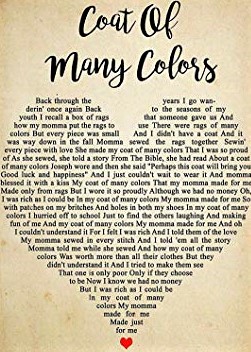
The title on top of this week’s blog could be a country song, and in a way, it is. Being grateful is a theme in so many country songs that they almost melt together into one. If your heart is attuned to that song, this Sunday’s mass readings may sing it back to you. In country music, the most grateful people are sometimes the poorest. For example, Dolly Parton’s “Coat of Many Colors” tells of a little girl whose mother sewed her a multi-colored coat made of rags. Though it made the girl a laughing stock at school, she was wise enough to …
… “make them see that one is only poor if they choose to be.”
Her grateful heart concludes the song:
“Now I know we had no money but I was rich as I could be in my coat of many colors my momma made for me.”
In Sunday’s scripture readings, lepers are the grateful ones. These are people with the fewest excuses to be grateful. In the first (2 Kgs 5:14-17), a leper named Naaman reluctantly takes the prophet Elisha’s advice as delivered through an intermediary to immerse himself seven times in the River Jordan in order to be healed. It works! Naaman then finds Elisha and, grateful for this miracle, offers a gift to pay him back. Elisha refuses. Instead, Naaman does what we now call paying it forward, with God on the receiving end.
Naaman said: “If you will not accept, please let me, your servant, have two mule-loads of earth, for I will no longer offer holocaust or sacrifice to any other god except to the LORD.”
A change of heart is God’s favorite gift, as Jesus taught us in the parable of the prodigal son. A perpetually faithful heart is rewarded in perpetuity, as Timothy tells us in Sunday’s second reading (2 Tm 2:8-13):
If we persevere we shall also reign with him.
But if we stop being faithful, will God imitate us? No, Timothy answers.
He remains faithful, for he cannot deny himself.
But when we gratefully imitate him in faithfulness, our grateful heart becomes its own reward. Look at Sunday’s gospel account of the grateful leper whom Jesus healed (Lk 17:11-19). He was one of ten so afflicted and so healed, but the only one who returned to give thanks—and he was a Samaritan, at that. When it came to being faithful, this foreigner to faith knew better than those who should have known better.
Jesus asks, “Where are the other nine? Has none but this foreigner returned to give thanks to God?” Then he said to [the Samaritan], “Stand up and go; your faith has saved you.”
Those nine ingrates are like many of us. We have so many blessings that we start taking them for granted. We’re used to wearing leather coats with silver linings. But on Sundays, how many of us put on our Sunday Suits, go to church and become the person we think God wants to see? The recent Ken Burns documentary about country music that ran on PBS and spotlighted many gospel-tinged songs like the afore-mentioned “Coat of Many Colors,” reported that some of this genre’s greatest artists exemplified our human dichotomy–the drunkards, the drug addicted, the divorcees, the cheaters, were also devout believers. Many were disabled, searching for ability; broken-hearted lovers, ready to forgive. Hank Williams was the best example. He actually took on a Dr. Jekyll-type persona he named “Luke the Drifter,” to sing his more spiritual songs, while his Hank the Hyde spent real life living on the dark side. We can thank God for many of his songs, like “Thank God,” which summarizes how God wants us to pay our gratitude forward:
Be forgivin’ to
the wayward
Like the Master told us to
When He said forgive them Father
For they know not what they do
They would change their way of livin’
If they could but understand
So remember they’re your brothers
They need a helpin’ hand.
Thank you, Hank. I mean, Luke.
–Tom Andel